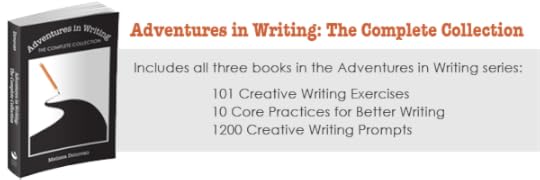K.D. Dowdall's Blog, page 51
October 17, 2017
How to Collect Writing Ideas While You’re Procrastinating Online
[image error] Melissa Donovan writes, “I love the web. In fact, I think it’s the single greatest invention of the twentieth century. It allows people to meet, connect, conduct business, and gather information quickly and easily, all from the comfort of…well, anywhere. It’s also an entertainment mecca. All that art! Music! Films! Literature! And games. The web is an enormous resource center, playground, and time suck.”
Distractions Abound Online
Distractions affect everybody, but writers are especially susceptible. As we sit crafting our prose, sometimes the muse escapes us and we’re tempted to venture away from our writing to find her again. The strongest among us will be able to resist the alluring pull of the Internet’s dazzling distractions. But most of us, in moments of great weakness and in times of desperate procrastination, will succumb to the clicking, often forgetting about the muse completely.
Now, I’m not going to encourage anyone to dawdle. But a little procrastination can be helpful. In fact, I’ve come up with lots of great ideas for blog posts while watching interviews on YouTube. I’ve concocted story ideas from images I perused on iStockPhoto. Tweets on Twitter have inspired poems. There is no limit to the writing ideas that can be found while randomly surfing around the Internet.
Mostly, I’m pretty good about restraining from distractions, but when I do succumb, I put procrastination to work for me!
I Made a Stash File
As I navigate around the Internet while avoiding inevitable tasks, I come across fascinating stuff — stuff I’d like to use — but later (because, you know, right now I’m working on something, sort of). In the past, I used my web browser to bookmark interesting sites so I could revisit them later. Eventually I switched to social bookmarking.
Things started getting spread out. If I wanted to go back to an illustration of an alien I saw three months ago or a mesmerizing poem I found a few weeks back, I would have to scroll through all my browser bookmarks, and then log in to three or four different accounts looking for the item of interest. The system wasn’t working for me.
Then I made a stash file.
Sometimes the Simplest Solutions Are the Best
It started with a text file. I found a particular site that I wanted to use as inspiration for a poem, but I didn’t want to lose the URL or forget where I’d stored it. So, I opened my text editor. I copied and pasted the URL along with a quick note to myself and saved the file to my desktop. Later, when I was ready, I knew exactly where to find it.
I started using that same file for other writing ideas that I found online. Then, I decided to expand my stash file. I created a folder on my desktop and moved the text file into it. Now I could save images to the folder. But for some of the images, I wanted to make notes. So I added a Word document to the folder (Word lets you copy and paste images directly to the document).
Now my stash file is bustling with writing ideas. I still use my other bookmarking systems, but for ideas and inspiration, I strictly use my stash file, and I love it. Sure, paper notebooks feel like home, but when you’re collecting ideas in the digital realm, you need a digital way to store them. I mean, who wants to hand-write URLs?
Tips for Stashing Your Collection of Ideas and Inspiration
You’ll need the following:
A desktop folder containing a text file and an MS Word file
The ability to copy and paste
Some time to waste
Over time, I’ve found a few ways to make this little system quite effective. For example, once I use an idea, I can delete it. This keeps the files short and easy to peruse. I’ve also thought about creating a third document that I can label “used ideas.” Then, I can just move stuff to that document and it will be there in case I need to refer back to it later.
My favorite feature in this system is that I can easily search through the material to quickly find what I’m looking for. It doesn’t matter if my documents grow to 10 pages or 100 pages because I use the Find feature. That’s when you hit command-F (control-F for Windows users) and then enter a word or phrase to search for. Within seconds I can find an item that’s buried in a document. Easy as pie.
How Do You Harvest and Store Writing Ideas?
I’m always looking for efficient ways to keep track of all the great writing ideas I come across. How do you do it? https://www.writingforward.com


October 13, 2017
Search for Maylee – A Review
Quoting the author of Search for Maylee, “It’s a cold dark world we live in, and Autumn is about to find out just how cruel it can be. Strength and determination are on Autumn’s side and she will do whatever it takes.”
Autumn, no stranger to grief and lost, is inconsolable when Maylee, her much loved niece is abducted a month before her high school graduation. Autumn has not given up hope of finding her – alive. She believes and is frustrated by what she sees as the detective in charge of Maylee’s case doing next to nothing to find Maylee.
Finally, Autumn decides to take matters into her own hands and gathers a strength within herself to search for Maylee – by herself, alone. She even moves across the country to find the man that abducted Maylee and to get Maylee back from him.
This fictional story is exceptionally well written, ominous, compelling, riveting, and portends the truth of what often happens to abducted young women. The same young women that we so often see in Newscasts, Internet, and in local newspapers, with pleas from family and friends to help find their loved one.
These abductions often cross our visual paths, but then, it is as quickly forgotten. But, what we don’t know, is that it is much worse than we ever thought possible. I highly recommend this spell-binding story, Search for Maylee.


October 9, 2017
Epic Takedown!
It is terrifying to think that one unstable man could start a nuclear war just for a personal vendetta not caring that other countries will start using their nuclear bombs and no one but a few brave souls will do anything to save our country and other countries as well.

This morning Mr. Trump took time from his busy schedule of gutting the Affordable Care Act, taking away free access to contraceptives for millions of women, playing chicken with North Korea and now Iran, first insulting and then throwing rolls of paper towels at hurricane victims in Puerto Rico, attacking sports players for exercising their First Amendment rights, claiming credit for inventing the word “fake”, and basically sending us all back to the Dark Ages. Yes, with everything on his plate he took the time to tweet some barbs at fellow Republican, Senator Bob Corker who recently announced he would not be running again in 2018. Among several tweets were:
Senator Bob Corker “begged” me to endorse him for re-election in Tennessee. I said “NO” and he dropped out. (said he could not win without my endorsement.) He also wanted to be Secretary of State, I said “NO THANKS.” He…
View original post 173 more words


The Witch Minnie Brogan
The Indian summer began like any other when I turned fifteen years old growing up in the small colonial era farming community of Granby, Connecticut. The last fields of the summer harvest had already been shorn of their corn, alfalfa, hay, and tobacco. The wet smell of fresh cut hay filled the air as well as the mingling aroma of tobacco fields that now lay bare of their crops. The large tobacco leafs would hang neatly from wooden poles to dry underneath white-sheeted tents.
The smell of tobacco, sweet and pungent, hung in the air. It was a grown-up smell, a smell of intimacy and secret goings-on. My cousin Garrett and I would sometimes sneak up behind the white-sheeted tents and listen. Giggles, laugher, and strange noises were not unfamiliar sounds to our ears as we listened. More than tobacco leafs nestled under the white-sheeted tents.
Not far from the tobacco field was an ancient apple orchard that looked like something out of a wicked fairy tale. Walking through its darkly gnarled wood was a rite-of-passage experience for anyone under the age of twelve.
To this day memories of Canton road, where I grew up, float across my senses. I envision its tar paved darkness as it crosses over Salmon Brook, cuts through McLean’s game preserve, wanders by weird old Stewart Duncan’s farm, and the said-to-be-haunted Sperry colonial homestead. Canton Road weaves it way over-laying the swell of land occupied for ten thousand years by the indigenous people like the Massaco Indians who were a part of the Algonquian tribes. Evidence of their inhabitation is still visible by those who know what to look for.
Spirit Pond is one of those places. There are sightings by the locals of ghost warriors that still drink the dark cold waters of Spirit Pond and are not as rare as one would like to believe. Spirit Pond is a large spring fed body of water surrounded by tall reeds and weeping willows. Its dark cold water and deep recesses still hold untold secrets as well as the body of Minnie Brogan.
My rather strange cousin Garrett was drawn to the story of Minnie Brogan and I followed suit. Beautiful Young Minnie Brogan who lived in early colonial times near the old settlement of Salmon Brook, adjacent to Spirit Pond, was said to have met with a ghastly end. It is a haunting legend of sorts and the story appears in the town’s tourist pamphlets as a way of advertising its colonial history to visitors.
It was said that young Minnie Brogan lived a solitary existence in her meager dwelling on the edge of Spirit Pond and tended a few chickens and a vegetable garden. She also grew medicinal herbs. In colonial times, a female living alone who also concocted remedies was sure to raise suspicions of witchcraft.
Yet, Garrett and I doubted this explanation and we would often sit by the edge of Spirit Pond trying to envision that long ago crime when Minnie Brogan was dragged from her thatched hut, bound by her hands and feet, and thrown into the spring fed pond. We wondered how scared she must have been as she slowly sank into Spirit Pond’s cold dark waters.
I personally believe there was more to it than just medicinal herbs. Minnie was young, alone, and was said to be hauntingly beautiful. She was accused of conjugating with evil forces. As a six grader, I had no idea someone could actually be murdered for not knowing how to conjugate a verb (although there were times I was sure by teacher at thought of it).
So, it was in winter when Spirit Pond was frozen-over that Garrett and I would go ice skating and just as often we would look to see if Minnie Brogan’s ghostly apparition would rise up from the ice. Although we never actually saw her ghostly-self rise from the pond, we imagined what she would look like if she did.
I wonder about Minnie Brogan’s secret hopes and dreams that vanished into the dark cold waters of Spirit Pond one nefarious moonless night long ago. Sometimes I even imagine I can feel her presence as I dip by fingers into the waters of Spirit Pond. It is though the earth remembers her and still holds her secret longings. I, too, will always remember Minnie Brogan.
by K D Dowdall
Copyright 2014


October 8, 2017
BEYOND TOMORROW!
Feel the sun upon your face and dream
Watch the clouds and learn to change
Look to a starry night and know light even in darkness
Gaze upon fields of wheat and see the gold
Go barefoot on a stony path and dance
Watch the trees in the forest and learn to see
Look upon mountains high and know the nobility in a blade of grass
Hear thunder on a stormy day and feel the power
Feel rain drops fall upon your face and drink
Watch lightening cross the sky and learn to strive
Look onto the heavens and know the magnificence of you
Feel the sand beneath your feet and run
Watch seabirds fly and learn to soar
Listen to the ocean and hear the siren’s song
Look to the endless blue horizon and know infinity
See life as one brand new so that you will remember
That you have come and gone before
And delight in all you see that you may learn
To look beyond tomorrow that you may know forever
By K. Demers Dowdall
Copyright 2010


October 7, 2017
SEARCH FOR MAYLEE – ITS FINALLY AVAILABLE!
Myself and so many other followers of Didi Oviatt have been waiting eagerly for Maylee to be published! Congratulations Didi!
I’m completely washed over with gratitude for everyone who has read, reviewed, and pre-ordered my book! The day I’ve been pacing the floors over is FINALLY HERE!! I love release days, it’s exactly like Christmas… only completely different lol. Now for a week of blog touring, and we’re off!!!

EXCERPT:
***There he was, the man she had spent her evenings swooning over while listening to the steady hum of his voice over the phone. A man that she once detested, and now ached for. There were so many things she wished could be different about this moment. She would have prepared herself, dressed nice and fixed her hair – probably up and swept from her face. She would have picked something with a low neckline to wear, lathered her skin with her silkiest lotions, and even taken the time to shave. Everything…
Rather than the romantic reunion Autumn had been…
View original post 464 more words


October 6, 2017
Dancing with Baby
A delightful poem that brings back memories, so sweet, of times we may wish to remember.

She fills the sink
Till the bubbles rise
And she sighs
Just like her dreams
The bubbles pop and disappear
Till she is left with only her fears
Baby’s pulling at her knee
She picks him up and twirls him
WEEEEEEEE………
The radio is playing its musical fantasy
Vibrating the air
And in the kitchen, there
She dances with baby on her hip
And because she loves
The laughter on his sweet face
She makes herself content to wait
To realize the dreams she needs
To make her life complete


October 5, 2017
HOW TO CRITIQUE YOUR MANUSCRIPT
[image error]On Victory Crayne’s website, a complete version of, How to Write a Critique is available. This site has many wonderful ways to improve a writer’s writing skills. I review this frequently to critique my own writing, I find it essential in developing better writing skills.
http://www.crayne.com/howcrit.html
Opening
Do the first few sentences or paragraphs of the story grab your attention? Do they present the protagonist’s main problem? Remember how you judge a book or story when you first see it in a bookstore. Don’t we often base our decision to buy or not buy upon those first few sentences? Did this author grab your attention fast enough?
Conflict
By conflict, I do not mean lots of slam-bam action. Conflict is “The mental or moral struggle caused by incompatible desires and aims. That is the kind of conflict that makes stories vitally alive.” – Ben Bova in “The Craft of Writing Science Fiction That Sells”.
Is there emotional conflict WITHIN the main character? Between the main characters? Emotional conflict is part of what gets readers interested. For example: love vs. loyalty; greed vs. duty; fear vs. desire; revenge vs. self-doubt. Is there enough conflict between the characters? Is it expressed through action, dialogue, attitudes, or values? Were the characters sufficiently contrasted? Or did they seem to be totally satisfied with their roles? Did they have the potential to transform each other?
Plot
Was the main plot clear and believable? Did the main character have a clearly defined problem to solve? Did you feel by the end of the piece that this problem was solved or did the character become resolved to live with it? Were you able to determine the time and place of the story quickly enough? Did the story start at the right place? Did it end at the right place in the plot? Are there scenes which do not seem to further the plot? Were there too many flashbacks, which broke your attention? Was every subplot useful? Did it add to the overall story or did the author seem to stick it in just for complexity?
Pacing:
Did the plot/subplots move fast enough to keep the reader’s attention? Resolution of conflict: Did the conflict and tension in the plots and subplots come to some reasonable ending? Or did the author leave us hanging, wondering what happened? When you finished, were there things that you still felt needed to be explained? If the author did leave some conflict unresolved, did they indicate somewhere that future stories are pending?
Setting
Is there enough description of the background in the story to paint a picture that seems real enough for the reader? Did you feel that you were transported to ‘that time or place’? Was there too much description so modern readers might tend to become bored? Was the description written with clichés? Did the author use good enough names for people, places, and things? Names help set the tone for a story. Were some names of people hard to keep track of? Did some names seem inconsistent with the character? Were the names too stereotypical.
Timing
Is the timing and order of events in the story consistent? For example, did John drive his new car on his vacation in chapter six but it wasn’t until chapter ten that he bought it?
Characterization
Did the people seem real? Or were the main characters stereotypes or one-dimensional cardboard characters? Were the facts about the characters accurate and consistent? People do not exist in a vacuum. They have family, friends, a job, worries, ambitions, etc. Did you get a sense of enough of these, but not too much, for the main characters? Did you get a good picture of the culture, historical period, location, and occupation of the main character? Did you get enough of a sense of paradoxes within the character? Enough of their emotions, attitudes, values?
Backstory: Were you distracted by too much background information of a character at one time? Did the author seem to dump a lot of information on the background of a character in one or two long speeches, or did we learn about that character here and there in smaller pieces? Did the protagonist undergo some change in the story? Does each chapter/page have enough sensory description? Can the reader easily sense what is happening physically to the main character? Were there enough words of sight, sound, touch, smell, or taste? If the story used a person as the antagonist (villain), did they seem real too? Or did they seem so evil or one-sided that they were more like ideal villains? Did they have some redeeming qualities too? Did the villain seem to be a hero in their own mind?
Dialogue
Did the words from the mouths of the people in the story seem consistent with their personalities? Was there too much or not enough dialogue, in your opinion? Usually writers err on the side of not enough dialogue. Did any character tend to talk in long monologues?
Were you able to sense the conflict, attitudes, and intentions of each character in their dialogue without the author telling you of these directly? Were you able to detect any exchange of power that is sexual, physical, political, or social? Did the dialogue seem easy to speak? Can you ‘hear’ it? If it sounds unusual, you might suggest that the writer try reading it aloud. Does each character have their own speech rhythm, accent (if necessary), vocabulary, and even length of sentences?
Point of View
Was a given chapter or section written from one person’s point of view? Are there too many points of view in the story? Did the story skip around between the first person or third person point of view (POV)? Were the changes in POV signaled clearly? If the story was written in the third person POV, as most stories are, did the story stick with the omniscient (all knowing) POV, use a limited POV (where we don’t know everyone’s motives except by clues from their words or actions), or did the author mix the two? Did the author’s choice seem right to you?
Show versus tell
When in the POV of a character, did the author describe what his/her senses showed, e.g., sight, sound, smell, touch, taste? Or did the author just tell you the dinner was very good? Did the author describe exactly how the people acted? Was there too much abstract language where specific details would have made a greater impact on the reader?
Format of the text
Was it easy to read or were the paragraphs too long or the lines too long (not enough margin)?
Would it help to put blank lines between paragraphs? If the piece is to be read on a computer monitor, adding a blank line between paragraphs will make it much easier for your critics to read. Note: when you submit the final version to print publishers, it is best to adhere to their manuscript format (no blank lines between paragraphs).
Grammar and spelling
Was the English readable? Were there too many grammatical errors, misuse of punctuation, run-on sentences, etc.?
Did you point out any typos or misspelling? How many times have you missed that in your writing because you passed over it without seeing it? Were there so many such errors that they made reading the piece difficult for you? Did the author use too many exclamation points (one of my weaknesses)? Were there any cliches in the narrative? For example, I once wrote “fruits of mother nature” and “thoughts burning in his mind”, both of which are cliches. In dialogue cliches are okay if the character would speak that way.
Style
You may wish to comment on the style the story was written in, e.g., humorous, wordy, sparse, literary, homespun, technical, etc.


October 4, 2017
Puerto Rico
The response by Trump to the catastrophe in Puerto Rico has been disgraceful, demeaning and life threatening. Puerto Ricans are American and far worse hurricane damage then either Texas and Florida without question. The reason Trump does not care is that they don’t have to right to vote. They need the most help to recover from this disaster. Please call your congressman and Senator. Thank you. Let’s Care about All Americans and give what we can. Thank you, Karen
I am writing today from within. I write from the roots of my being. I am an American, a Puerto Rican. I am the daughter of an island born on the mainland of a country in turmoil over identity. Today, I see inaction on behalf of other American citizens, on inhabitants of an island in despair. Americans absent from inclusion, they live on an island bombarded by the waters of grief and we are all hurting. Our island is in trouble and we are stranded on the mainland, hopeless, fearful, and desperate.
La isla del encanto, la isla de mi niñez, drowned by a storm— is surfacing for air.
And I see all of us crying out for our people.
I see humanity emerging from the depths of tragedy.
We cry out with memories of a coqui singing, the sounds of parrandas bellowing through the night, el cuatro is the…
View original post 317 more words


October 1, 2017
Beautiful Writing: Part 2: William Shakespeare
 charles french words reading and writing
charles french words reading and writing

I would certainly be avoiding the truth and not doing duty to writing if I did not include in this series the man who is certainly the best and most important writer in English Drama and Literature: William Shakespeare.
In full disclosure, I am a Shakespearean. I have made the study of his work one of my areas of my Ph.D. in English, I have taught Shakespeare many times, I have presented papers on Shakespeare, and I have directed and acted in his plays. So, I do come with a particular bias, but I maintain that his work is the core of English Literature.
You certainly do not have to agree with me.
I will offer a few examples:
Sonnet 116
“Let me not to the marriage of true minds
Admit impediments. Love is not love
Which alters when it alteration finds,
Or bends with the remover to remove:
View original post 565 more words










